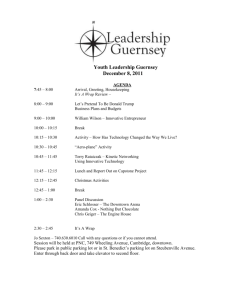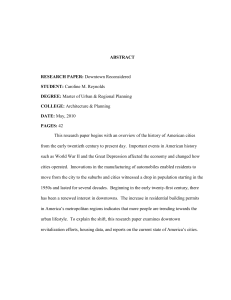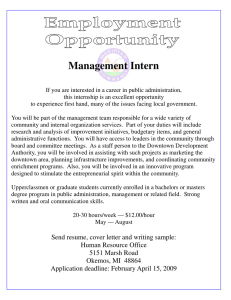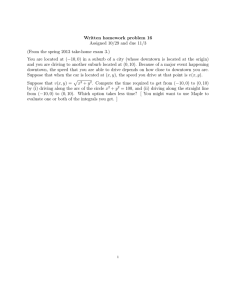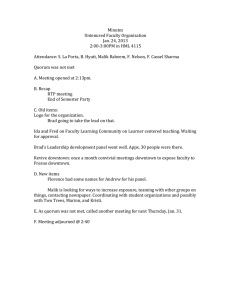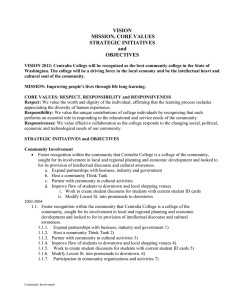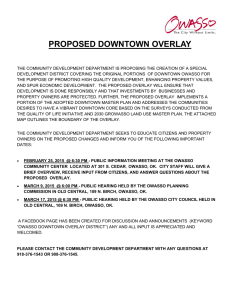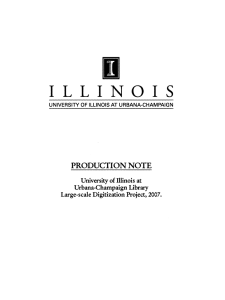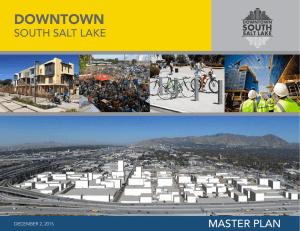NEED A COMMUNITY PLAN ? Providing CARE for Healthy Communities
advertisement
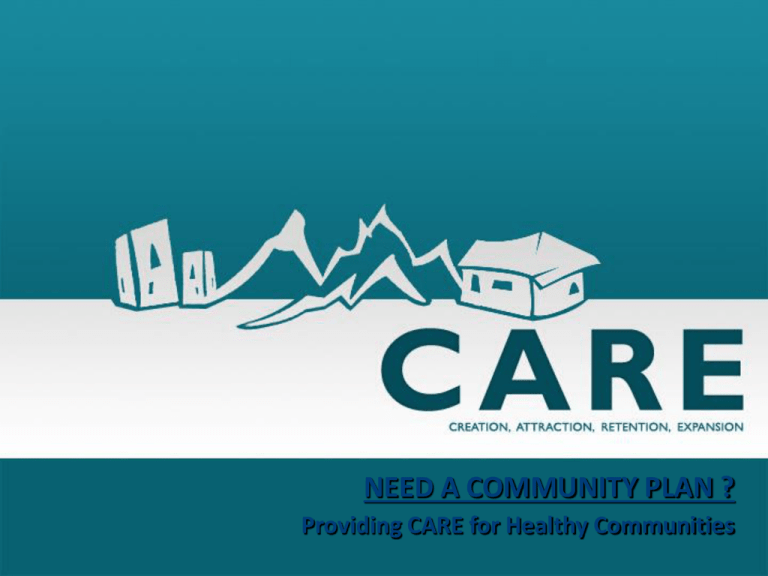
NEED A COMMUNITY PLAN ? Providing CARE for Healthy Communities Strategic Planning for Local Economic Development: An Outline I. II. Economic Development Options A. Defining Economic Development B. The “CARE” Model Benefits of Strategic Planning III. Ten Steps to Your Community’s Future IV. Strategic Planning Concepts V. Successful Planning Efforts VI. Tools to Aid in Developing a Strategy Economic Development Can Mean Many Things to Different People Economy “…is a system for meeting the needs and wants of people in a particular geographic area.” Development “…is the improvement of well-being for residents in a particular geographic area.” Economic Development “Any activity which provides additional jobs and income given a community’s standard or quality of life.” The CARE Model of Economic Development • • • • Create new employment opportunities! Attract business activity! Retain existing business and industry! Expand current job/income sources! Which option is the best for your community? Creation: New Businesses Need Support in Several Areas • Capital Financing • Labor Supply • Technology • Management Assistance Attraction or Business and Industry Recruitment • Is the most well-known economic development option. • Local communities should assess their chances of recruiting a basic employer. • Major metropolitan areas will attract most larger employers. Factors that Influence Larger Employers Include: 1. Labor Supply 2. Transportation 3. Location of related businesses 4. Water and other resource constraints 5. Community attitude and/or preparedness Retention of Existing Income and Jobs • Do your local consumers spend money for goods and services in other communities? • How much? • Could special events and promotions lead to more local shopping? • What would this mean to your local merchants? Expansion of Existing Firms • This can become an important source of new job growth in the community. • Existing businesses can be supported by: – Training Programs – Financial Assistance – Positive Attitude from the Community • On-site visitations can “red-flag” the needs of the business community. Strategic Planning • Is similar to a business developing a business plan. • Is the process of identifying future goals and how to achieve them. • Does require forward thinking and anticipation of the future 7 Benefits of Strategic Planning 1. Outlines the steps to follow. A community must identify the steps necessary to achieve its final goal. 2. Promotes efficient use of resources. A significant amount of time, money and people will be required for economic development efforts. 3. Improves coordination. Many different groups should be involved. 4. Builds consensus. The public and private sectors must agree on the major issues. 5. Increases public awareness. Without public support, economic development cannot happen. 6. Strengthens the community’s competitive position. 7. Encourages forward thinking. There’s nothing mystical about developing a strategy. Communication Hard Work Cooperation Thought Ten Steps to Your Community’s Future: 1. Begin/Continue the Process: Someone must make the initial decision to build a community strategy. - Are the benefits worth the effort? - Call in outside resource providers. Ten Steps to Your Community’s Future: 2. Engage the Community. Broad community support is critical. Seek support from the following: - Public Sector - Private Sector -Volunteer Organizations Ten Steps to Your Community’s Future: 3. Form an organized structure. Utilize an existing group or form a new organization. 4. Conduct community assessments. Data and information can be very useful. 5. Develop a strategic plan. Identify goals and measurable objectives. 6. Seek community feedback and commitment. Share the draft with the community. Involve the Ten Steps to Your Community’s Future: 7. Implement the plan. - Are adequate resources available. - Are adequate volunteers available? - This is the stage when most plans falter. - Will your plan end up “sitting on the shelf?” - A lack of resources will insure disappointment. Ten Steps to Your Community’s Future: 8. Evaluate the effort. Set benchmarks and document success. 9. Celebrate successes. Reward yourself and the entire community when goals or tasks are accomplished. 10.Create an ongoing process. The effort does not end, but should be re-evaluated annually. (10) Create Ongoing Process (1) Begin/Continue the Process (2) Engage the Community & Legitimize the Process (9) Celebrate Successes (3) Form An Organized Structure (8) Evaluate the Effort (4) Conduct Community Assessments (7) Implement the Plan (6) Seek Community Feedback & Commitment (5) Develop a Strategic Plan Strategic Planning Concepts • • • • Mission Statement Goals Objectives Strategy “If you don’t know where you are going, any road will get you there.” Mission Statement: The community’s philosophy for development. “To make Sulphur a better place to live, to work, and to conduct business.” (Example) “To create an environment that allows Coalgate to provide reasonable business growth and employment opportunities for Coalgate residents.” (Example) A mission statement will answer some of the following questions: • Who are we serving? • What markets will be served? • What are the major outputs or products of the organization? • What defines the organization’s constraints? • What functions does the organization perform? • For whom does the organization perform these functions? • How does the organization fulfill these functions? After Defining the Mission, Set Some GOALS • An end-state or result to be achieved. • Specific statement of what the community would like to be. • The more explicit the goal, the better. • Based on more than wishful thinking. • Must contain a sense of economic reality. • Provides specific direction for the planning process. Examples of Goals: “Bring customers back to the downtown shopping area.” “Become a retirement destination community.” “Expand the agricultural processing industry in the southwestern part of the state.” For Each Goal, List Some OBJECTIVES Each objectives should define: • The key result to be achieved. • Numerical measures of the progress. • Target date for completion. Objectives vs. Goals (What’s the Difference?) • Goals are aspirations while objective are targets. • Objectives are actions that allow the community to reach its goals. • Progress toward objectives is measurable. The Goal: “Bring customers back to the downtown shopping area.” 1. 2. Some Objectives Make the area more attractive to customers by June of next year. - Add benches and planters - Bring in new stores - Clean up the downtown area Make shopping more convenient by next June. - More on-street parking - Access to alley parking - Add a parking lot in specified location Strategy or Strategic Action: A project or activity undertaken to accomplish the defined objective. Objective: Make the area more attractive to customers by next June. Strategies: - Add benches and planters - Bring in new stores - Clean up the downtown area Concerns when selecting strategies: • How much will the proposed program cost? • What are the relative costs and benefits of various options? Strategic Planning/Economic Development Action Work Plan Goal: Objective: Agency or Group: Project Manager: Strategic Action Time Frame Possible Contacts or Resources Staffing Requirements Estimated Budget $ Source of Funds A VISION OF THE FUTURE Future A SHARED VISION OF THE FUTURE Present A community with no shared vision of its future. A community with a vision and action plan that is not supported by its citizens (no alignment with the vision). A shared vision and action plan supported by community (community organizations and institutions aligned with the vision). You are seeking the alignment of organizations - their agendas, their resources, and their actions - to an overall vision for the future which they help develop. SOURCE: Mark Peterson, Cooperative Extension Service, University of Arkansas Three Conclusions about Successful Community Strategies 1. No strategy should be dismissed automatically as inappropriate. 2. There is no unique formula that can work in all places under all conditions. 3. Careful analysis of unique local situations is required for success. Keys for Success • • • • • • • Local Commitment Broad Community Involvement Community Ownership On-Site Visits Reliable Survey and Secondary Data Exposure to New Information Timely Response TOOLS to Aid in Developing a Strategy: • Survey Instruments – Helps identify strengths and weaknesses in the community. – Helps set priorities for economic development. – Helps inform a cross-section of the community about the economic development effort and can help gain their support if they are given an opportunity to express their opinions. Here is a list of things that are important to a town. Be absolutely honest, how do you rate your town? In answering the questions below, please make a check mark in the appropriate column. Good 1 2 3 4 5 6 7 8 9 10 11 12 13 14 15 16 17 18 19 20 21 22 23 24 25 Streets & Roads Traffic Conditions Parking Downtown Police Protection Fire Protection Garbage Collection & Disposal Water Supply Sewage Collection & Disposal Community Parks & Playgrounds Recreation for Adults Recreation for Teenagers Recreation for Children 12 & under Library Flood Control Crime Prevention Programs Ambulance Service Availability of Doctors Availability of Dentists Availability of Emergency Care Availability of Care for the Elderly Availability of Housing Condition of School Building Elementary Education High School Education Vocational Education-Job Training Fair Poor Do Not Know What are the strengths and weaknesses of our town? Your answers to this survey will assist in the development of the Economic Development Strategy for . Our objective is to identify the needs we have in and to find out what you feel should be done to make this town a better place to live, work, rear children, do business, and enjoy life. Please be as candid and as specific as possible in your answers (each survey is confidential). A. In your opinion, what are the biggest strengths or advantages in which could lead to future growth? 1. 2. 3. B. What would you say are some of the biggest problems and obstacles faced by future growth of the area? (note in order of importance) 1. 4. 2. 5. 3. 6. C. Identify in your opinion which of the following are most important; with highest priority rated #1. Rank Rank Attracting New Industry Create Community Organizations Expand Local Industry Downtown Revitalization Retail & Commercial Development Retirement Industry Development Expand Tourism Industry Create Home Grown Businesses Expand Community Services Other for the
